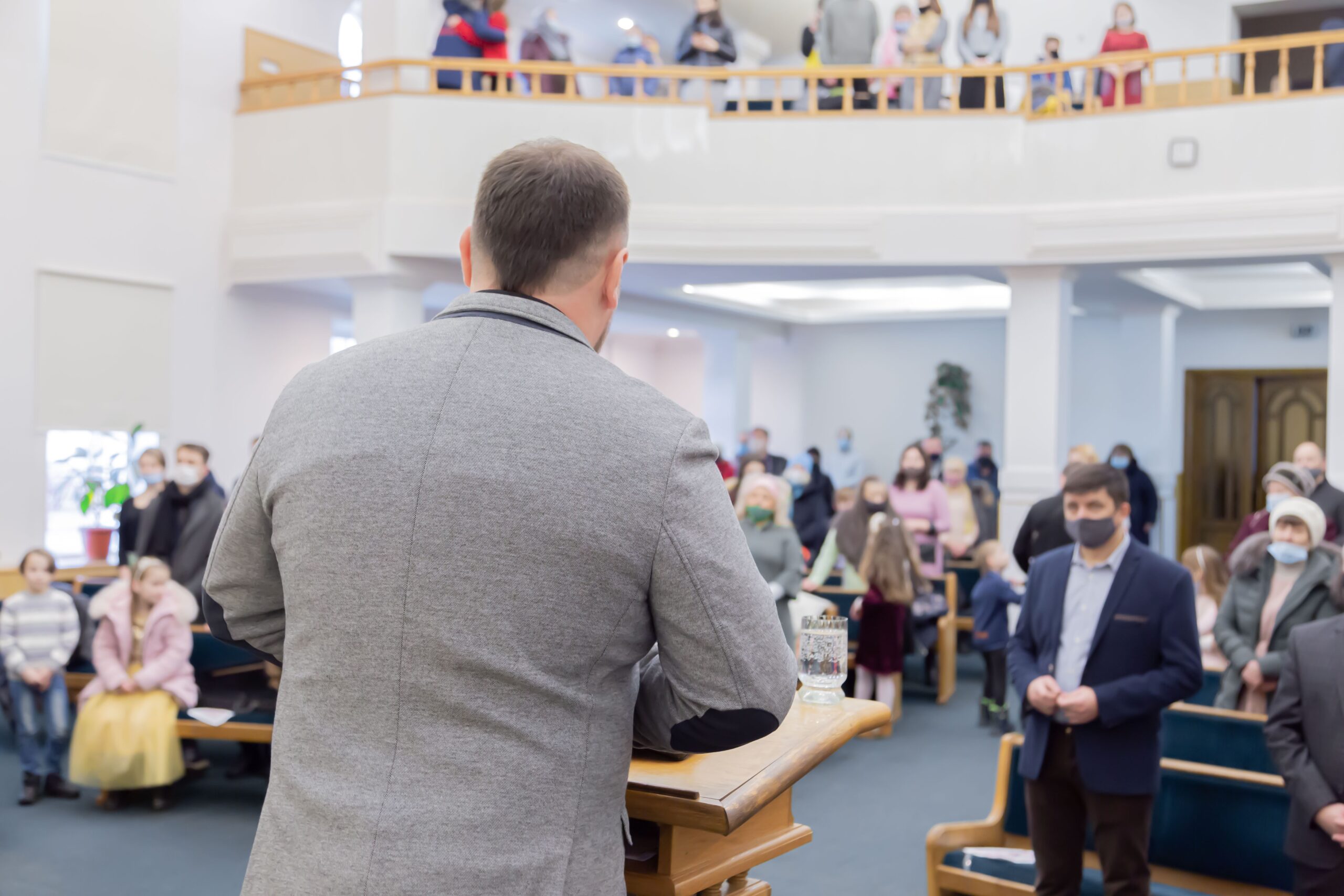Why Christians Are Monogamists
During the week, a married Nigerian celebrity named Yul Edochie, son of a veteran actor posted pictures of his new wife and child. The announcement was met on social media with outrage on one hand and commendation on the other.
Some were angry that the first wife only got to know about the new wife on social media; others were angry that he could marry a new wife after the first one stood by him through all his initial struggles on the path to fame. Those who seem to know more about the details were angry that he only married the lady after impregnating her as a side chick (mistress).
Those who are in support of polygamy, for ideological or practical reasons, defended Yul, while some of them only emphasised that men who plan to marry multiple wives should inform their prospective first wife before the marriage (they didn’t say anything about cases where the desire to marry multiple wives come after the first marriage and could not have been foreknown).
Amidst the whole back and forth, some have impugned the Christian insistence on monogamy. Some railed against it as a product of western imperialism, insisting that our forefathers were polygamists. Others insisted that monogamy is a denial of what we must all acknowledge: men are polygamists by nature. Reno Omokri, a famous and infamous commentator on political, religious, and social issues tweeted that “polygamy is scriptural” and that Christ preached celibacy, not monogamy.
Is this true? Is polygamy scriptural? Did Christ teach celibacy and not monogamy? And is monogamy a vestige of western imperialism that we should ditch for good?
Let’s see.
Monogamy as a creation ordinance
Preliminary considerations
Many Christians have been trained in proof-texting – the process of looking for a bible text or texts to support or oppose something – so it’s difficult for them to think in systematic or theological categories – where we look at the Bible’s message as a whole.
While many in the quarters of the church might be more comfortable with quick proof-texting – the kind that Reno Omokri was requesting in that tweet – it is inconsistent with the very nature of the Scriptures. The Bible is a narrative, not mumbo-jumbo of free-flying texts that were lumped together.
Therefore, when considering any biblical topic, a systematic or theological approach is preferable since it is more consistent and faithful to God’s revelation of himself.
Edward Clowney, a late theologian, has identified four levels of orders that apply to the way Christ orders his church: creation order, restored order, heavenly order, and consummation order. [1]
The creation order stands for ideals that God instituted at creation. Between the creation order and the restored order (which began with the coming of Christ), there are “ordinances in a fallen world,” orders and laws that God has instituted to deal with the fact that we live in a fallen world. The restored order begins with Christ and includes the restoration of creation ideals as well as the redemption of curses that accompanied the fall. The heavenly order represents all the ways the church enjoys the “foretaste of glory” and the “beginning of renewal.” The consummation order is life in the New Jerusalem.
In the book, the creation of humanity as male and female is an example of creation order; obedience to human leaders that were set up to preserve peace and order in this fallen world is an example of “ordinances in a fallen world;” doing our work unto the Lord, bearing children in faith, love, holiness, and self-control, and ending slavery are examples of restoration order; the end of marriage in the new heaven and earth is an example of consummation order.
One husband, one wife
My first point is that monogamy is one of the ordinances that belong to the creation order.
In the garden, Adam saw in Eve the bone of his bones and the flesh of his flesh and he went on to marry her (Genesis 2:18-23). The author of Genesis did not see this as just an instance of a marriage, rather, he saw in this first marriage an ordinance for all men:
“Therefore a man shall leave his father and his mother and hold fast to his wife, and they shall become one flesh” (Genesis 2:24).
In essence, the marriage of Adam and Eve becomes a creation ordinance, a model of the one-flesh union through which God will populate the earth. The important point here is not that Adam married Eve (since there was no one else he could marry) but that the author here describes marriage as a one-flesh union between a man and a woman.
Jesus will later use this text to teach that divorce was not part of God’s original design. In explaining this text, he said “so they are no longer two but one flesh” (Matthew 19:6). He is making the point that marriage, as ordained by God in creation, is a union of two people only: a man and a woman.
Commenting on Genesis 2:24, John Gill said “the union between them is so close, as if they were but one person, one soul, one body; and which is to be observed against polygamy, unlawful divorces, and all uncleanness, fornication, and adultery.”[2]

Monogamy and polygamy after the fall
The first recorded polygamist in the Bible is Lamech (Genesis 4:23). The Bible does not trace the development of polygamy but we see that it comes after the fall (Genesis 3) starting with a descendant of Cain.
And though his unsavoury character should not be taken as a condemnation of polygamy, “nevertheless, the fact that Gen 2 pictures the ideal relationship between man and woman may suggest that the author regards monogamy as the norm and that Lamek’s bigamy reflects one aspect of his decline from the creator’s pattern for human life,” said Gordon Wenham, an OT scholar. [3]
However, polygamy was not limited to the unrighteous Lamech. Abraham, the father of Faith, was a polygamist. So was Jacob (even though he was tricked into it). Famous Israelite kings like David and Solomon were also polygamists. Elkanah, the father of Samuel, Israel’s famous prophet, was also a polygamist.
Nevertheless, people like Isaac, Noah, Joseph, Job, and Boaz were monogamists.
In Deuteronomy 21:15-17 and Exodus 21:10, we see God regulating polygamous marriages among Israelites. He didn’t outlaw it; rather, he gave regulations that will ensure equity in its administration while monogamy remains the ideal.
What are we to think of the fact that God did not specifically condemn Abraham and David for their polygamy and that he permitted and even gave regulations for such marriages in the Mosaic law?
We don’t need to go far. In his discussion with the Jews in Matthew 19, Jesus was clear that God sometimes allows situations that are not ideal because of the hardness of the heart of those involved (verse 8). Here, Jesus was talking specifically about the easy divorce (for any cause – verse 3) that was practiced by some Jews and approved by the school of Hillel.
According to Jesus, God’s creation ordinance is the permanent union of a man and woman in a one-flesh union. However, God accommodated that creation ordinance to the reality of the Israelites’ hard hearts to permit divorce (the keyword is “permit”). But it was not so from the beginning. As D.A Carson said, “Jesus taught that Moses’ concession reflected not the true creation ordinance but the hardness of men’s hearts. Divorce is not part of the creator’s perfect design … divorce is never to be thought of as a God-ordained, morally neutral option but as evidence of sin, of hardness of heart.”[4]
This helps us to understand why God permitted (by regulating) polygamous marriages without commanding them. God didn’t command divorce but permitted it because, in the beginning, it was not so. In the same way, he permitted polygamous marriages without commanding or idealising them.
Nevertheless, students of Jewish history have said that polygamous marriages were exceptions in the post-exilic period (the period after the exile). They were also criticised during the intertestamental period (informally known as the period between Malachi and Matthew) when they even declined further. The Dead Sea scrolls also showed that many smaller Jewish sects expressly forbade polygamy.
Why did God permit polygamy in the cases identified above? No one knows for sure since the Bible does not state such reason(s) explicitly. Got Questions has suggested these reasons:
“So, it seems that God may have allowed polygamy to protect and provide for the women who could not find a husband otherwise. A man would take multiple wives and serve as the provider and protector of all of them. While definitely not ideal, living in a polygamist household was far better than the alternatives: prostitution, slavery, or starvation. In addition to the protection/provision factor, polygamy enabled a much faster expansion of humanity, fulfilling God’s command to “be fruitful and increase in number; multiply on the earth” (Genesis 9:7). Men are capable of impregnating multiple women in the same time period, causing humanity to grow much faster than if each man was only producing one child each year.”
Whatever the reasons, the point here is that polygamy was a concession, not a command or a creation ordinance.

The restoration and heavenly order
In Matthew 19, Jesus did not allow his audience to keep enjoying the benefits of easy divorces that Moses permitted due to the hardness of their hearts. Rather, he pointed them back to the creation order to discourage divorce, normalise permanence, and only permit divorce in the case of adultery.
Similarly, Jesus and his apostles normalised monogamous marriages among the new Israel, the church, by pointing them not to the concession in the Mosaic law but to the creation order. Here, monogamy was not just an ideal but a requirement, a restoration of the creation order.
However, the NT established monogamy based on the restoration of the creation order as well as the heavenly order.
We see the latter in Ephesians 5 where the marriage relationship becomes a metaphor for Christ and his bride, the Church (Ephesians 5:25). In verses 28-32, Paul combines the heavenly order and the restoration order. In verse 28, he quotes Genesis 2:24 to establish the latter. He then concludes, emphasising the heavenly order:
“This mystery is profound, and I am saying that it refers to Christ and the church. However, let each one of you love his wife as himself, and let the wife see that she respects her husband” (Ephesians 5:32-33).
Note that the fact that Christ is married to one wife, the church, informs the norm of Christian marriage. Our marriages are monogamous because Christ’s marriage is. Every husband has one wife and he is to love that one wife as himself, just like Christ loves the church. Every wife has one husband and he is to respect him, just like the church honours Christ.
Paul dealt extensively with marriage, divorce, and remarriage in 1 Corinthians 7. That Christian marriage is monogamous is assumed all through.
In 2 Corinthians 11:2, Paul insists that he has married the local church in Corinth to one husband – Christ – and that precludes them from giving themselves to anyone else. Again, the marriage between Christ and the church is monogamous and exclusive.
If marriage takes up this importance, then polygamy is a false representation of the marriage between Christ and the church. Is Christ married to the church and then to another body? Polyandry too is forbidden on the same ground: Is the church married to another groom aside from Christ? No.
Polygamy, therefore, is not only contrary to the creation order, it also undermines the reality of Christ’s redemptive marriage to the church. This is why there is no permission or concession for polygamy in Christianity as it was in Judaism.

What about 1 Timothy 3:2?
People like Reno argue that the prohibition of polygamy for church elders in this verse means it was permissible for the laity and only forbidden for church leaders.
This makes no sense. First, none of the other virtues listed here are optional for the laity. Does the laity have to be above reproach, sober-minded, self-controlled, respectable, hospitable (verse 2)? Or is it permissible for the laity to be drunkards, violent, harsh, quarrelsome, and lovers of money? A little familiarity with the NT makes the answer obvious.
Only the gift of teaching and the requirement not to be a recent convert are unique to the clergy. All the moral virtues in this section are also required of the laity.
The point of this chapter is to highlight that church leaders must exemplify these virtues; that is, they must not be lacking in them. “It is surprising that the required standards, particularly the negative ones (e.g. not given to much wine, not quarrelsome) do not lead us to suppose that the usual aspirant for office was of a particularly high quality, since no exceptional virtues are demanded,” said Donald Guthrie in his commentary on the pastoral epistles (Timothy and Titus). “Yet this in itself accurately reflects the earliest state of the Christian church, when the majority of converts probably came from a background of low moral ideals.”[5]
Secondly, the requirement to be a husband of one wife can be seen as restricting the office of an elder from those who have married multiple wives before their conversion. As Guthrie puts it “no Christian, whether an overseer or not, would have been allowed to practice polygamy (cf. Bernard). The only occasion for such an injunction would be to exclude from office any who before their conversion had been polygamists.”[6] This means that church leaders were themselves to be a model of monogamy for the whole congregation. While the church accepted those who had been polygamous from their previous religions, they limited the office of elders to the monogamous since they are to be exemplars of Christian morality.
Alternatively, we can “regard the words in a more general way as meaning that an overseer must embrace a strict morality.” That is, just like the other moral standards belong to every believer, this one also belongs to laity and clergy alike and it is included to remind church leaders of the high standard they must exemplify. In this view, we don’t need to conclude how the churches dealt with people coming from polygamous marriages (whether they were required to stay with only one or were allowed to stay with them all and were only prevented from serving as church leaders).
In conclusion, there is nothing here to suggest that monogamy was a standard for church leaders while polygamy was permissible for the members. Every believer is a priest and king (1 Peter 2:9-10, Rev 1:6) and we are all called to model the monogamous marriage between Christ and the church.
The consummation order
Jesus insists in Matthew 22:30 that there won’t be (human) marriage in heaven. The metaphor will give way to the ultimate reality; the only marriage will be that of Christ and his bride, the redeemed and now glorified church.
John describes it this way: “Let us rejoice and exult and give him the glory, for the marriage of the Lamb has come, and his Bride has made herself ready; it was granted her to clothe herself with fine linen, bright and pure”— for the fine linen is the righteous deeds of the saints. And the angel said to me, “Write this: Blessed are those who are invited to the marriage supper of the Lamb.” And he said to me, “These are the true words of God” (Revelation 19:7-9).
Our temporal marriages here are, therefore, pointers to the eschatological marriage between Christ and the glorified church.
What about non-Christians?
While polygamy was permitted in the OT, most of the polygamous marriages mentioned specifically led to dysfunctional families.
Sarah had issues with Abraham’s second wife and this led Abraham to send her (Hagar) away with her little child (Gen 16:1-5). Jacob loved Rachel more than Leah and God opened the womb of the latter while the former was barren, a situation that led to envy and more wives (Gen 29:31-30:1). Elkanah loved Hannah more than Peninnah and this led to envy (1 Samuel 6:4-6)
Solomon’s heart was turned away from the Lord by his wives (1 Kings 11:4) while David’s child from one mother raped the other (2 Samuel 13).
An academic paper published by BioMed Central, an open source for peer-reviewed journals in Biology and Medicine, has shown that “women in polygamous marriages had a 2.25 (95% CI: 1.20, 4.20) higher chance of experiencing depression than in monogamous marriages. Children with polygamous parents had a significantly higher Global Severity Index with a mean difference of 0.21 (95% CI: 0.10, 0.33) than those with monogamous parents.”
Another collation of academic research published by the National Center for Biotechnology Information, a part of the US National Library of Medicine, suggests “a more significant prevalence of mental-health issues in polygynous women compared to monogamous women. Individual studies report a higher prevalence of somatization, depression, anxiety, hostility, psychoticism and psychiatric disorder in polygynous wives as well as reduced life and marital satisfaction, problematic family functioning and low self-esteem.
Biblical examples and present research shows that polygamy has a tendency to breed dysfunctions that undermine the flourishing of those involved.
Because of these, monogamy should be encouraged even among people who are not believers. For example, even though the West has parted ways with much of the Christian influence on its civilisation, monogamy is still upheld as a good marital ideal even when other distortions of marriage have been introduced and accepted. The Mormons, who accept polygamy, are still seen as some sort of weirdos.
Of course, none of these is said to undermine the fact that monogamous marriages also have issues. However, polygamy doesn’t solve those issues, instead, it introduces a new set of issues. Lovely polygamous marriages may exist but in most cases, polygamy itself is not intrinsic to that loveliness and happiness and a higher level of flourishing could have been possible in monogamy.
Again, God’s creation ordinance is monogamous marriage between a man and a woman and humans will flourish the most when we stick to what God has designed.
What about adultery?
Is it not better to marry more than one wife instead of committing adultery?
To start with, no one owes himself or herself a duty to have sex outside marriage. The whole idea that men are naturally polygamous and that somehow justifies polygamy or adultery is stupid. Many of us have many vices that are natural to us. But instead of indulging them, we seek to overcome them and live by higher moral standards for our good and that of everyone else.
To assume that we must do whatever we desire is to diminish human dignity. We are not animals; we are created in God’s image. As dignified bearers of God’s image, we have the ability and duty to say no to desires that are immoral and selfish.
We are fallen creatures, therefore, many of our desires, even those that come naturally, will be evil, reflective of our fallenness. It’s our human responsibility to sift through those desires and fulfil those that are moral and noble, in obedience to the law of God written on our hearts (Romans 2:14-14). We call it self-control.
This is especially important for us believers. Self-control is a fruit of the Spirit (Galatians 5:23). We must yield ourselves as instruments of righteousness instead of sin (Romans 6). Like Paul, we must discipline our bodies and keep them under control (1 Corinthians 9:27).
Having said that, is it really true that polygamy can cure or limit adultery?
First, even if it did, it remains the fact that monogamy is a creation ordinance and also a heavenly order for the believer. Second, polygamy has its own costs. Even if it reduces adultery, we must ask if that benefit is worth the cost and if human dignity does not require us to cure adultery through other means: self-control and covenantal commitment (Malachi 2:14).
Third, if we see adultery as covenantal unfaithfulness, then, the idea that someone who can be unfaithful to one covenant will suddenly be faithful because he is now in two covenants looks far-fetched. Why do people commit adultery? Is it not because they find something attractive in other people (however unreasonable it is) that they value more than their covenant with their partner? Can we then say that everything that can ever attract an unfaithful man has been exhausted in two or three or four women? It’s obvious that the answer is no. If adultery makes the woman of the house unhappy, does the fact that his husband marries the next beautiful girl suddenly make her happy or less unhappy? Or does a man or woman now have to marry every woman she finds attractive to avoid adultery?
Fourth, if we seek to avoid adultery without exercising self-control and committing ourselves to the covenant we have made, why is polygamy a superior solution to open marriages? At least the latter avoids some of the dysfunctions that often come with polygamy. Why are we against open marriages? Is it not because it erodes the dignity of participants and undermines the exclusiveness that is appropriate to marriage? If so, why not appeal to the same dignity and covenantal faithfulness (exclusiveness) to discourage adultery?
Fifth, what if someone argues that adultery is less common in countries where polygamy is permissible. Well, according to Pew Research, “Fewer than 1% of Muslim men live with more than one spouse in Afghanistan, Pakistan, Bangladesh, Iran and Egypt – all countries where the practice is legal at least for Muslims.” Therefore, if adultery is less common in those countries, it will not be because of polygamy. In the same way, the secularised west, unmoored from its Christian past and ideals cannot be used to correlate monogamy with a higher incidence of adultery. The problem with the west is not monogamy but sexual libertarianism which is the result of secularism and secularisation. Or are same-sex marriages, open marriages, and transgenderism not also realities in those countries?
To go back to our question: Is it not better to marry her than commit adultery with her? No! It’s better you exercise self-control and place premium value on the covenant you made with your wife.
Polygamy and the lack of husbands
It’s important to reiterate that this whole section (what about non-Christians?) considers the issue from a general, natural law perspective. For believers, this whole section is unnecessary. It’s enough that monogamy is the approved Christian form of marriage.
However, I have included this section as an appeal to keep monogamy as the preferred form of marriage in the broader society.
With that out of the way, what about those who believe that polygamy is essential if we are to deal with the imbalance between the number of men and women when it comes to marriage.
First, we now live in a world where women can take care of themselves without being married to a man. This is not 6,000 BC when many women depend on having a man for basic sustenance. Therefore, it’s not really necessary that every woman marries.
Second, there is nothing wrong with singleness. This is hard to take and many people desire marriage who won’t have it. But if it’s the reality that there is an imbalance between the number of men and women, single people can still live flourishing lives that do not involve the dysfunctions associated with polygamy, fornication, or adultery. All of these seem strange and unacceptable because our generation has been so sexualised that we prefer to wreck homes and other people’s lives because of it. My point is that we need to normalise singleness without idealising it. Marriage is still the ideal but when it’s impossible to have, a self-controlled singleness is still preferable to the other options.
Third, the gap between the number of men and women is not that great statistically. According to Statista, there are 104.47 million men and 101.67 million women in Nigeria, that’s 1.03 men for every woman. Consequently, we should focus our efforts on encouraging and incentivising (including economic incentives) more men to embrace married life instead of trying to circulate women among already-married men.
In fact, I believe that the more we discourage adultery, the more men and women will actually open their eyes to see all the people they can make their own wives and husbands without destroying other people’s happiness. This will also include fighting against the materialism that has engulfed our cultures since it’s undeniable that the primary reason many men and women will go after the married instead of other single guys and girls is money.

Monogamy and western imperialism
Monogamy is a Christian doctrine, not a western export. It can only be a western export to the extent that Christianity is a western export.
Christianity started in the Middle East and Asia Minor before going to the west. If Christianity had dominated in the East instead of the West, then monogamy would have been the norm in the East. The point here is that monogamy is Christian and it’s only western because Christianity was foundational to western civilisation.
This idea that monogamy is a result of western imperialism is part of a larger effort to subvert foreign religions in favour of indigenous ones. The point to make quickly is that we have no reason to stick to the religions of our fathers if we believe that another one is the truth (see Paul in Philippians 3). That our fathers practiced a religion has nothing to do with its truth value. If the metaphysics of a “foreign” religion better corresponds to reality, then if we love the truth, we would embrace it, not because we believe the foreigners are intrinsically superior to our fathers but because they have the truth in this particular case and we don’t (just as we have the truth in other cases and they don’t).
People who rail against western religion don’t rail against western technology and innovations. Why not be consistent and reject all technological innovations that didn’t come from our fathers?
Every culture is dynamic. When a culture meets with another, it adapts one or two things. The question is if we are adapting things that are true and contribute to our flourishing. A cultural isolation and superiority complex that rejects everything that didn’t come from our fathers is infantile.
If the Christian God is the true God, I want to worship him and ignore the false ones my fathers worshipped. If Christian morality reflects the will of the God who made us and is best suited to human flourishing, I want to embrace that instead of those of my fathers. Mere traditionalism and conservatism that holds on to traditions just for the sake of it is inimical to true human development.
Conclusion
Monogamy was God’s creation ordinance. Because of the fall, God permitted polygamy while still holding monogamy as the ideal. In the new covenant community, God has restored the creation order fully. Also, by virtue of the heavenly order, monogamy becomes the only form of marriage that mirrors the marriage between Christ and his bride. This eschatological marriage between Christ and his church will be the only marriage in the consummation order and our monogamous marriages here on earth anticipate that consummation.
Polygamy has been and is fraught with various dysfunctions that can minimise human flourishing. Therefore, even non-Christians are wise to embrace it as the ideal. The purported advantages of polygamy – minimising adultery and dealing with the imbalance between the number of men and women – are elusive and the costs are much more than the supposed benefits. Overcoming adultery requires self-control and covenant faithfulness and the more we embrace those two, the more we realise that there are actually massive opportunities for everyone to have his or her own spouse in a monogamous marriage.
Despite its challenges – challenges resulting from our sinfulness rather than the form of the marriage – monogamous is most capable of ensuring human flourishing in a way that preserves human dignity. We should embrace it as the gift of God.
God, give us Christian homes!
Homes where the Bible is loved and taught,
Homes where the Master’s will is sought,
Homes crowned with beauty Your love has wrought;
God, give us Christian homes;
God, give us Christian homes!
God, give us Christian homes!
Homes where the father is true and strong,
Homes that are free from the blight of wrong,
Homes that are joyous with love and song;
God, give us Christian homes;
God, give us Christian homes!
God, give us Christian homes!
Homes where the mother, in caring quest,
Strives to show others Your way is best,
Homes where the Lord is an honored guest;
God, give us Christian homes;
God, give us Christian homes!
God, give us Christian homes!
Homes where the children are led to know
Christ in His beauty who loves them so,
Homes where the altar fires burn and glow;
God, give us Christian homes;
God, give us Christian homes![7]
Footnotes
[1] Edward Clowney, The Church (Illinois: InterVarsity Press, 1995), 223.
[2] Riversoft Systems (2022). My Sword Bible. Retrieved from https://www.mysword.info/
[3] Gordon Wenham, Genesis 1-15 (Texas: Word Books Publisher, 1998), Location 4435, Mobi.
[4] D.A Carson, Matthew (Michigan: Zondervan Publishing, 2010), 926, Mobi.
[5] Donald Guthrie, The Pastoral Epistles (Illinois: InterVarsity Press, 1990), 95
[6] Ibid.
[7] B.B. Mckinney. God Give Us Christian Homes in Baptist Hymnal (Nashville: Convention Press, 1991), No 504


